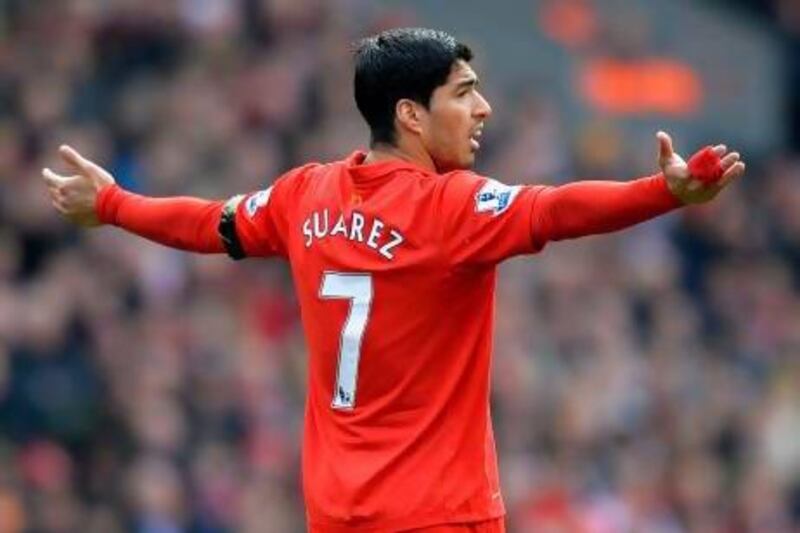One way of assessing how strongly professional football disapproves of Luis Suarez's behaviour is to ask: How many would like him in their team? The answer is plenty, for all the baggage.
Indeed, the checking-in of yet more baggage under his name in the last week - Suarez's televised bite on Chelsea's Branislav Ivanovic and his subsequent 10-match ban - predictably and instantly put the Uruguayan a notch higher on the list of potential transfer targets for a number of European clubs.
Suarez to Barcelona, as an upgrade on David Villa? Suarez to Juventus, to boost the Italian champions' potency up front? In the business of modern football, a villain is always a potential bargain.
Of the men on the shortlist for the PFA's Footballer of the Year award - which includes Juan Mata and Michael Carrick - only Gareth Bale and Eden Hazard might be valued higher in terms of a transfer fee. They are younger than the 26-year-old South American.
Robin Van Persie, the only man with more Premier League goals this season than Suarez, turns 30 this summer.
Suarez had been the pacesetter in the race for the English Golden Boot for most of the season. His suspension means he will not finish as the league's leading marksman. But his goals have been scored not for the runaway league leaders; they have been eked out for a mid-table Liverpool.
His tally of 30, in all competitions, include no penalties; they also denote a stride forward in his development. This is a footballer who has worked to master the Premier League, more than doubled his total goals of last season, and his goals-per-game ratio.
His quick-thinking, balance and inventiveness had always made him a threat. Improved finishing has put him among the very highest echelon of strikers.
Imagine, then, if Suarez could complete a campaign without a long ban. He will miss the remainder of the current campaign, thanks to the bite. He missed eight matches in 2011/12 after the English Football Association found Suarez had racially abused Manchester United's Patrice Evra during a Liverpool-United fixture.
While with Ajax in 2010/11, and five months after having been named Dutch football's Player of the Year, Suarez was handed a seven-match ban for biting PSV Eindhoven's Otman Bakkal.
There is more, even without detailing the shrill complaints from Premier League opponents about his supposed diving to win penalties or free kicks, the unsportsmanlike gestures towards fans and defeated opponents.
Suarez is currently subject to a Fifa investigation into an alleged punch he directed at Chile's Gonzalo Jara during a World Cup qualifier. He could face a substantial international suspension. Uruguay, struggling to reach the 2014 World Cup finals in Brazil, dread an outcome that would remove their leading scorer in qualifying from key matches.
To this catalogue of incidents might be added the handball, on the Uruguay goal-line, which denied Ghana their last-minute winner in a 2010 World Cup quarter-final.
The touchline celebration as Asamoah Gyan missed the resulting spot kick gave a global audience a clear portrait of Suarez as a sportsman whose desire for advantage, whose competitive drive has among its components a willingness to go outside the laws of the game. He is certainly not unique for that.
Sometimes, the tendency is explained according to native tradition: Uruguay, a small country which more than punches its weight in terms of producing world-class talent, is the land of the "garra charrua", the phrase used to describe an unyielding hardness on the field.
In Uruguay, where Suarez grew up one of seven children whose parents separated before he was 10, often gets painted as victim of the English media's lively appetite for a pantomime villain.
I asked the former national team coach, Gustavo Ferrin, about his former student - he worked with the teenaged Suarez in national youth teams - and how he is portrayed. He suggested the player, rather than being devious, was perhaps a little naive.
"Football projects people very quickly and suddenly," said Ferrin. "We have to remember they generally come from lower-class backgrounds and sometimes they don't take account of how others will react to what they do. I know Luis as an excellent person and I am pleased at how much success he has had in a top league."
Praise for the personal qualities of Suarez are not isolated to compatriots. At Ajax, Suarez was made captain, a role he also had for Uruguay's Olympic team last summer.
But Suarez's presence among the candidates for England's Footballer of the Year, voting for which took place between two of his now serial long-term suspensions, has provoked an unusually intense debate about how far such awards should acknowledge a sportsman's impact as a role model.
Suarez is not a good one. He is not a very useful teammate, either, in the long periods he is banned.
Follow us
[ @SprtNationalUAE ]






